|
Guideposts
Emmett and Steve -Theirs
is an amazing
story of unconditional love and sacrifice.
Brothers
June 1973:
On a weekend at the New Jersey Shore, the car driven by 18-year-old
Emmett - my next brother down in our family of five boys and a girl
- was hit and totally demolished by 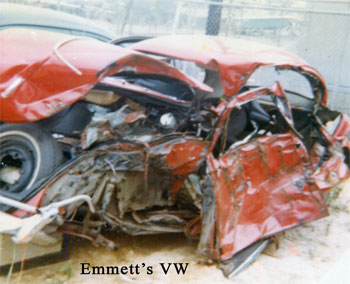 a
car driven by a teenager who'd been drinking. The police told us Emmett
was dead. Then doctors located a faint heartbeat. Injuries to Emmett's
body were confined to a broken collarbone and lacerated left arm. But
you couldn't see the severest damage. It was inside his head - in his
brain - causing what the physicians call "a persistent vegetative
state". Coma. a
car driven by a teenager who'd been drinking. The police told us Emmett
was dead. Then doctors located a faint heartbeat. Injuries to Emmett's
body were confined to a broken collarbone and lacerated left arm. But
you couldn't see the severest damage. It was inside his head - in his
brain - causing what the physicians call "a persistent vegetative
state". Coma.
The first time I saw Emmett in the University of Pennsylvania in Philadelphia,
I fainted. His big, six foot frame was strung with tubes, and a clear
plastic globe around his head sprouted wires that reported his vital
signs to a computer. He lay on a ice blanket, and the blend of cold
and warm air enveloped him in an eerie fog.
Emmett had just graduated from high school, and I - four years younger
- had just graduated from Notre Dame. A few days earlier I'd started
a job to earn money for a trip to Europe. I felt I needed to get away
from my family - from the familiar - and do some serious thinking about
my goals in life. But Emmett's deathlike state filled my mind. He couldn't
walk, talk, drink, eat, see, or think. He was alive only because a machine
was breathing for him.
Day after day my family and I kept a vigil in the Intensive Care Unit.
Emmett's girl friend Diane, an attractive high school senior, was usually
with us. Emmett just lay there, unaware, unmoving. The only thing we
could for him was pray and we did plenty of that.
In the hour's drive back and forth to the hospital from our home in
Haddonfield, New Jersey, my father would start a prayer. Then we would
take turns praying aloud, or we pray in unison. We prayed at home or
at church, and so did our friends. We prayed not only for Emmett, but
also for ourselves - for the strength to keep striving and hoping in
the face of a grave prognosis.
At last, on the 15th day, the doctors told us Emmett was responding
- just barely - when his hand was squeezed. That was all my father needed.
He grabbed Emmett's left hand. "Emmett," he said in a choked
voice, "we're praying so hard for you. Can you pray and fight back?
Squeeze my hand if you can."
He paused, then turned to the rest of us. "He squeezed my hand.
He really squeezed. He wants to fight and pray to come back, and each
of us is going to help. We'll keep on fighting and praying with him."
Maybe Emmett squeezed and maybe he didn't. After several tries to get
him to respond to me, I wasn't convinced. But the next day Emmett did
something that broke throw my skepticism. I was holding a telephone
to his ear while our four-year-old brother Kevin, who hero-worshipped
him, bombarded him with questions. "Emmett? You know how you always
tell me 'hang in there'? Remember that, Emmett? I miss you. When will
you come home? Soon, Emmett?"
I looked down at Emmett's masklike face. His cheeks were wet with tears.
I didn't realize it at the time, but at that moment I committed myself
to Emmett, to reclaiming him mentally and physically. Good-bye summer
job. Good-bye Europe. Good-bye independence. The battle to save Emmett's
life was about to consume two years of my life.
July 1973: The
next day I had my first disagreement with the medical establishment.
The doctor was shaking his head. "I doubt those were tears. His
eyes were watering. That often happens with people in a coma."
"Those were tears. I'm sure of it."
"You know, Steve, imagination is a powerful force when you want
very much to believe something.
"Doctor, I cut him off, "Emmett's a stranger to you. But I
know my brother's a fighter. As long as there's a breath in him, the
guy will not give up. I think he can make it back."
"I don't believe you understand how bad his situation is. Mentally
he's almost a blank."
I nodded - and found myself outlining my new "fight" strategy.
I understand that, Doctor. It's as though Emmett has a hundred miles
to go and we have to help him an inch at a time. But after yesterday
I'm positive he has some awareness - enough for us to work with. If
we can only build that up enough so Emmett catches on to what's expected
of him, he'll fight back with us."
The opening move in my campaign was finding out as much as I could about
coma, as fast as possible. From doctors and material I read in the library
I learned that Emmett needed stimulation. Massive doses of it. Yet at
the same time he needed to sleep a lot. I decided to try stimulating
him an hour at a time, then giving him an hour's rest. When I mentioned
my plan to Emmett's girlfriend Diane, she offered to help me.
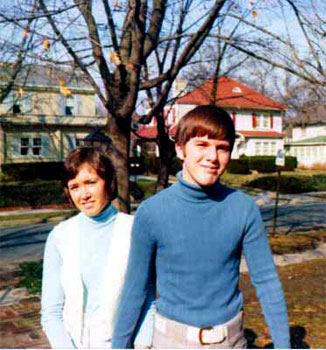 A
month after the accident, when Emmett was released from the Intensive
Care Unit to round-the-clock private-duty nurses, Diane and I started
our work. It was grueling. For an hour we'd talk to Emmett about what
was happening at home, how everybody was asking about him. When one
of us ran out of small talk, the other took over. After an hour, we
would put a cassette of quiet music in Diane's tape player. After 60
minutes of that, we would read from current magazines, play lively music
and sing, clap our hands and tap our feet. Meanwhile, twice a day, a
physical therapist gave Emmett passive exercises, pushing and pulling
his arms, legs, fingers and toes. She taught us how to do the movements,
and we repeated them another two or three times a day. A
month after the accident, when Emmett was released from the Intensive
Care Unit to round-the-clock private-duty nurses, Diane and I started
our work. It was grueling. For an hour we'd talk to Emmett about what
was happening at home, how everybody was asking about him. When one
of us ran out of small talk, the other took over. After an hour, we
would put a cassette of quiet music in Diane's tape player. After 60
minutes of that, we would read from current magazines, play lively music
and sing, clap our hands and tap our feet. Meanwhile, twice a day, a
physical therapist gave Emmett passive exercises, pushing and pulling
his arms, legs, fingers and toes. She taught us how to do the movements,
and we repeated them another two or three times a day.
We worked with Emmett 12 hours a day for six straight days. He remained
unchanged. Once in a while he'd give a weak little squeeze when we urged
him, but most times not. Another day went by and another. Emmett's brown
eyes were open a little more than they had been - they were dull and
glazed but open.
One day, when my parents came into the room, I noticed that Emmett's
eyes moved toward the sound. I told my mother and she rushed to the
bedside and held on to Emmett. "Do you know me, Emmett? Do you
recognize me? Tell me, Emmett!"
A rasping groan came from deep down inside him: "Mmmmmmmomm."
August 1973:
Now, Diane
and I became teachers. Demanding ones. Emmett was unwilling - or unable
- to speak again, but we got him to "talk" to us with his
left hand (his right side was paralyzed). We asked him questions he
could answer with his fingers - one for yes, two for 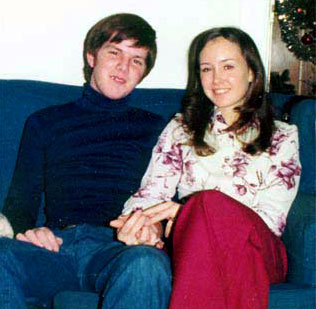 no. no.
"Is your sister named Sue, Emmett?" One finger.
"Am I your brother Kevin?" Two fingers.
"Emmett, you and I and Diane are here. How many people is that?"
Three fingers.
Meanwhile, we were delving deeper into prayer. My father joined a special
prayer group. My mother had decided that since Emmett had so many physical
problems she would pray for one improvement at a time. She began by
praying specifically for his eyesight.
On August 18, holding four fingers in front of his face, Mother asked
Emmett, "How many fingers do you see?"
Slowly his fingers moved - one, two, three, four!
After that, Emmett began to see a tiny bit better every day.
Now and then we were able to get him to say a few one-syllable words,
but he did nothing on hid own. Never spoke, never responded, never responded,
never ate, drank or moved unless we urged him.
September 1973:
With somber warnings not to let our expectations rise too high, the
doctors allowed us to transfer Emmett to a rehabilitation center where
trained therapists could concentrate on trying to improve his speech
and physical movement. The medical word that frightened Diane and me
most was "plateau." It meant that Emmett's progress could
flatten out at any time - get to a certain level and never go any further.
Our fears worsened after Emmett had been at the rehab center a few days.
Diane and I were the only two people who had been observing him constantly
and minutely 12 hours a day for over a month - and we believed that
the routine therapy he was getting was not adequate. In fact, it was
clear to us that no center anywhere could provide the
extra effort he needed to keep from deteriorating or plateauing. He
had to have all-day every-day, one-on-one therapy.
So Diane and I decided to supply that extra effort ourselves. The center
finished working with Emmett at 4:00 p.m. each day. From 4:00 to 10:00
p.m. during daily visiting hours, we would take over.
I'd learned a lot about weight lifting and other kinds of physical conditioning
while earning my black belt in karate. A physical therapist at the hospital
had shown me how to work with Emmett using parallel bars to help him
stand up and mat exercises for sit-ups to build his muscle strength.
Diane's job was to supplement the work of the speech therapist. Emmett
had aphasia; his ability to use words correctly had damaged. The part
of his brain that recognized objects had lost contact with the part
that named them. Diane held up various objects for Emmett to identify,
corrected him when he was wrong - which was almost always - and encouraged
him at the same time. "You're mixed up on the name of things, Emmett.
Working with me will help straighten you out. Want to try again?"
During the hours we worked with Emmett we prayed for small gains - for
one more sit-up, one more step using the support bars, one more sign
of word-recognition. And we thanked God for the least little sign of
progress.
October 1973:
A new problem. Emmett got a staph infection - a liability of prolonged
hospital stays. But once over that hurdle, our inch-by-inch progress
continued. By now Emmett's neck muscles were strong enough to keep his
head from lolling to the side if it wasn't strapped in place, and he
learned to feed himself and kick his paralyzed right leg a little when
we asked him to. Since he could now hold his torso erect in a wheelchair,
we began taking Emmett outside.
On his first outing Emmett heaved himself forward to pull up a few blades
of grass, to feel the earth he'd been away from so long. But that hopeful
sign was wiped out a few weeks later.
Diane was showing Emmett a picture of a house. "Can you name this?"
"Hous-hou-Howard Johnson."
We all laughed, including Emmett. Except that he went on and on, out
of control, and it was an idiot's laugh.
The doctor explained that when the parts of the brain that control the
emotion system are damaged, the patient's reaction may be overblown.
No telling how long the symptom would last.
We hoped it would go away soon, but it didn't. From then on, it happened
at least two or three times a day.
November 1973:
The better I got at working out with Emmett, the more convinced I became
that he should be brought home where our family could focus on stimulating
him mentally and physically all the time. He was still only half-awake,
someone who looked - and acted - both crippled and retarded.
Also, Emmett was in constant pain from the irritation of the urinary
catheter he'd worn since the accident. The rehab center could do little
to help him develop bladder control - that would take constant supervision,
day and night. At home, I could give him that.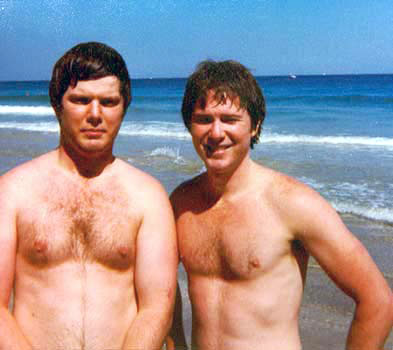
At first my parents were afraid of the responsibility of having Emmett
at home. But after praying and a few trial visits on weekends they felt
more secure. The day before Thanksgiving Emmett came home.
We put Emmett's bed in an alcove off the living room, and I slept on
a cot beside him so he could wake me whenever he needed me. I'd located
a health spa where he could work out, and my mother had found a speech
pathologist. She also hired people to tutor him in math and English.
Although Diane had a lesser role to play with Emmett, she visited and
kept him company faithfully, something that most people outside the
family didn't feel comfortable about doing for more than a few minutes
at a time.
Our next goal was to get him to take steps without the support of the
parallel bars. We had exercised the atrophied muscles on his paralyzed
right side enough to achieve some movement. Now the obstacle was his
lack of balance. He couldn't take more than a step or two without falling
down.
I had no idea what to do about that. To complicate matters, I was beginning
to feel impatient and defeated about Emmett's slow progress. Meanwhile,
my own time to travel and begin a career was passing by.
I must have shown my frustration because one day my mother took me aside.
"What's the matter, Steve?"
"Nothing special."
"I know better. Tell me about it."
"Oh, I'm just discouraged, I guess. Sometimes I think I'm wasting
my time. That no matter how I try, Emmett will never be able to walk."
My mother took hold of my shoulders.
"Never say that. He will walk. Because you're going
to help him."
I don't know if it was her conviction or the challenge or foolish pride
or sentiment. But I heard myself saying something incredible. "You're
right, Mom. And my Christmas present to you is going to be Emmett walking."
It was more than incredible. It was crazy. How could Emmett walk if
he couldn't regain his balance?
What happened next is an example of the leading we felt we were getting
from God.
December 1973:
I was visiting a friend and his wife and their three year-old son, watching
the baby crawl on the floor and pull himself up, holding on to chairs
and tables.
"See that?" his mother remarked. "Any day now he'll start
taking steps and then he'll be walking instead of crawling."
That was it! Crawling was what Emmett needed to do to help get back
his balance - and his confidence - back. The very next day my mother
and I began teaching him to crawl. We worked on his paralyzed side while
Emmett coordinated the movements of his left arm and leg. Right arm
forward, left leg forward. Left arm forward, right leg forward.
After practicing 20 minutes morning, noon and night for two weeks, Emmett
was crawling - not fast or smoothly, but crawling. At the spa we had
a program of chin-ups, knee bends, swimming and working with a shoulder
wheel and a stationary bike (I had to tie Emmett's right foot to the
pedal till he could keep it in place on his own). When Emmett's knees
got sore from crawling I bought him knee pads - and also a quad cane
which has a four-prong base. One day, with his left hand grasping the
cane and me holding the back of his belt, Emmett took his first lurching
step. Christmas was only a week away.
Emmett worked earnestly, wobbling, tottering forward with the quad cane,
relying on me to steady him with a hand on his shoulder. As he struggled,
I noticed a frown wrinkle his face now and then. I wondered about it.
He hadn't shown emotion for such a long time. When I mentioned it to
a pathologist, though, he was negative. "That doesn't mean he feels
anything - it's just a reflex."
Christmas morning came. After all the family's presents had been opened
and the wrappings cleared away, I gave my mother an envelope and pushed
Emmett's wheelchair around the hallway.
I hear her read the message to the others. "Merry Christmas, Mom.
Look who's coming. With love from Steve."
In the hallway, I helped Emmett stand up and get set with the quad cane.
"Okay, now, slow and careful does it. Keep your mind on what you're
doing. You know what this means to Mom."
With a nod, Emmett began his journey. One foot in front of the other,
wavering, recovering. Now he was in the entrance of the living room,
where everyone sat frozen, silent, watching.
Halfway across the room he began to sway. I steadied him with a hand
on his shoulder. One more step. Another. Another. Three steps to Mom.
Now two. Now one.
He stood in front of her.
My mother wrapped her arms around him and my father hugged them both.
I stared at Emmett. His eyes were still glazed, but something shone
from them that was clearly recognizable. Pride.
January 1974
- and After: Emmett's triumphant walk came six months after
the accident. Another year and a half would go by before I felt free
to go back to my own life, to work on a career or even to think about
having a girlfriend. I' discovered that I was too involved - some said
"obsessed" - with Emmett to put any substance into any other
kind of relationship.
As for Emmett, there was no point where he "turned a corner"
and was suddenly all right again. It continued to be a matter of adding
on - bit by bit, inch by inch, day by day. Eventually he could crawl
up and down stairs... had better breath pressure, controlled his bladder
eight hours at a time... was able to use an ordinary cane, then walk
unaided. The idiot laugh disappeared. He climbed the stairs. Little
signs showed his volition was coming back. He'd be the first one to
say "Hello". Or he'd turn off radio music he didn't like.
His flat, monotonous speech gained rhythm and tone.
Now, more than 10 years later, many changes have come to Emmett, Diane,
and me. Gradually, Diane began to resume a life independent of Emmett.
In time she married and had two children. I moved to New York and took
up a career as an actor and writer. After undergraduate work at Millsaps
College, Emmett settled in Florida. Apart from a slight residual weakness
on his right side, he's perfectly well, able to work, and as I write
this, he's planning to marry a delightful young woman who adores him.
Today, some people who hear about Emmett's recovery call it a miracle.
I resent that. Miracles are supernatural. This wasn't. Reclaiming Emmett's
life was a human battle, carried on with intensive, monotonous, stubborn
persistence by my family and Diane and me. We're ordinary people and
we overcame fear and pessimism and poor odds and even cold facts by
concentrating totally on hard work and the most natural thing in the
world - prayer.
I'm not saying that every desperate coma case will respond to a massive
family effort the way Emmett did. Coma therapy is a young science; research
and clinical experience are limited. Time and time again, the doctors
told us, "Don't get your hopes up."
But what if we hadn't?
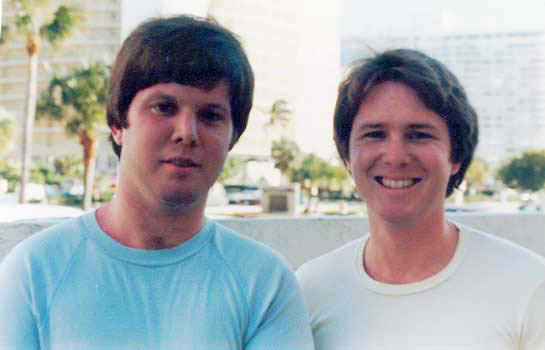
Top
|
 a
car driven by a teenager who'd been drinking. The police told us Emmett
was dead. Then doctors located a faint heartbeat. Injuries to Emmett's
body were confined to a broken collarbone and lacerated left arm. But
you couldn't see the severest damage. It was inside his head - in his
brain - causing what the physicians call "a persistent vegetative
state". Coma.
a
car driven by a teenager who'd been drinking. The police told us Emmett
was dead. Then doctors located a faint heartbeat. Injuries to Emmett's
body were confined to a broken collarbone and lacerated left arm. But
you couldn't see the severest damage. It was inside his head - in his
brain - causing what the physicians call "a persistent vegetative
state". Coma. A
month after the accident, when Emmett was released from the Intensive
Care Unit to round-the-clock private-duty nurses, Diane and I started
our work. It was grueling. For an hour we'd talk to Emmett about what
was happening at home, how everybody was asking about him. When one
of us ran out of small talk, the other took over. After an hour, we
would put a cassette of quiet music in Diane's tape player. After 60
minutes of that, we would read from current magazines, play lively music
and sing, clap our hands and tap our feet. Meanwhile, twice a day, a
physical therapist gave Emmett passive exercises, pushing and pulling
his arms, legs, fingers and toes. She taught us how to do the movements,
and we repeated them another two or three times a day.
A
month after the accident, when Emmett was released from the Intensive
Care Unit to round-the-clock private-duty nurses, Diane and I started
our work. It was grueling. For an hour we'd talk to Emmett about what
was happening at home, how everybody was asking about him. When one
of us ran out of small talk, the other took over. After an hour, we
would put a cassette of quiet music in Diane's tape player. After 60
minutes of that, we would read from current magazines, play lively music
and sing, clap our hands and tap our feet. Meanwhile, twice a day, a
physical therapist gave Emmett passive exercises, pushing and pulling
his arms, legs, fingers and toes. She taught us how to do the movements,
and we repeated them another two or three times a day. no.
no.
